In the Dark Read online
Page 9
Wroxham thrilled from head to foot. The body in the chair stirred – hardly stirred – shivered rather – and a very faint, far-away voice said:
‘Now the third – give me the third.’
‘What?’ said Roger, stupidly; and he had to clear his throat twice before he could say even that.
‘The moment is now,’ said the doctor. ‘I remember all. I made you a god. Give me the third drug.’
‘Where is it?’ Roger asked.
‘It is at my elbow,’ the doctor murmured. ‘I submit – I submit. Give me the third drug, and let me be as you are.’
‘As I am?’ said Roger. ‘You forget. I am bound.’
‘Break your bonds,’ the doctor urged, in a quick, small voice. ‘I trust you now. You are stronger than all men, as you are wiser. Stretch your muscles, and the bandages will fall asunder like snow-wreaths.’
‘It is too late,’ Wroxham said, and laughed; ‘all that is over. I am not wise anymore, and I have only the strength of a man. I am tired and wounded. I cannot break your bonds – I cannot help you!’
‘But if you cannot help me – it is death,’ said the doctor.
‘It is death,’ said Roger. ‘Do you feel it coming on you?’
‘I feel life returning,’ said the doctor; ‘it is now the moment – the one possible moment. And I cannot reach it. Oh, give it me – give it me!’
Then Roger cried out suddenly, in a loud voice: ‘Now, by God in heaven, you damned decadent, I am glad that I cannot give it. Yes if it costs me my life, it’s worth it, you madman, so that your life ends too. Now be silent, and die like a man, if you have it in you.’
Only one word seemed to reach the man in the chair.
‘A decadent!’ he repeated. ‘I? But no, I am like you – I see what I will. I close my eyes, and I see – no – not that – ah! – not that!’ He writhed faintly in his chair, and to Roger it seemed that for that writhing figure there would be no return of power and life and will.
‘Not that,’ he moaned. ‘Not that,’ and writhed in a gasping anguish that bore no more words.
Roger lay and watched him, and presently he writhed from the chair to the floor, tearing feebly at it with his fingers, moaned, shuddered, and lay very still.
Of all that befell Roger in that house, the worst was now. For now he knew that he was alone with the dead, and between him and death stretched certain hours and days. For the porte cochère was locked; the doors of the house itself were locked – heavy doors and the locks new.
‘I am alone in the house,’ the doctor had said. ‘No one comes here but me.’
No one would come. He would die there – he, Roger Wroxham – ‘poor old Roger Wroxham, who was no one’s enemy but his own.’ Tears pricked his eyes. He shook his head impatiently and they fell from his lashes.
‘You fool,’ he said, ‘can’t you die like a man either?’
Then he set his teeth and made himself lie still. It seemed to him that now Despair laid her hand on his heart. But, to speak truth, it was Hope whose hand lay there. This was so much more than a man should be called on to bear – it could not be true. It was an evil dream. He would wake presently. Or if it were, indeed, real – then someone would come, someone must come. God could not let nobody come to save him.
And late at night, when heart and brain had been stretched to the point where both break and let in the sea of madness, someone came.
The interminable day had worn itself out. Roger had screamed, yelled, shouted till his throat was dried up, his lips baked and cracked. No one heard. How should they? The twilight had thickened and thickened, till at last it made a shroud for the dead man on the floor by the chair. And there were other dead men in that house; and as Roger ceased to see the one he saw the others – the quiet, awful faces, the lean hands, the straight, stiff limbs laid out one beyond another in the room of death. They at least were not bound. If they should rise in their white wrappings and, crossing that empty sleeping chamber very softly, come slowly up the stairs …
A stair creaked.
His ears, strained with hours of listening, thought themselves befooled. But his cowering heart knew better.
Again a stair creaked. There was a hand on the door.
‘Then it is all over,’ said Roger in the darkness, ‘and I am mad.’
The door opened very slowly, very cautiously. There was no light. Only the sound of soft feet and draperies that rustled.
Then suddenly a match spurted – light struck at his eyes; a flicker of lit candle-wick steadying to flame. And the things that had come were not those quiet people creeping up to match their death with his death in life, but human creatures, alive, breathing, with eyes that moved and glittered, lips that breathed and spoke.
‘He must be here,’ one said. ‘Lisette watched all day; he never came out. He must be here – there is nowhere else.’
Then they set up the candle-end on the table, and he saw their faces. They were the Apaches who had set on him in that lonely street, and who had sought him here – to set on him again.
He sucked his dry tongue, licked his dry lips, and cried aloud:
‘Here I am! Oh, kill me! For the love of God, brothers, kill me now!’
And even before he spoke, they had seen him, and seen what lay on the floor.
‘He died this morning. I am bound. Kill me, brothers; I cannot die slowly here alone. Oh, kill me, for Christ’s sake!’
But already the three were pressing on each other at a doorway suddenly grown too narrow. They could kill a living man, but they could not face death, quiet, enthroned.
‘For the love of Christ,’ Roger screamed, ‘have pity! Kill me outright! Come back – come back!’
And then, since even Apaches are human, one of them did come back. It was the one he had flung into the gutter. The feet of the others sounded on the stairs as he caught up the candle and bent over Roger, knife in hand.
‘Make sure,’ said Roger, through set teeth.
‘Nom d’un nom,’ said the Apache, with worse words, and cut the bandages here, and here, and here again, and there, and lower, to the very feet.
Then this good Samaritan helped Roger to rise, and when he could not stand, the Samaritan half pulled, half carried him down those many steps, till they came upon the others putting on their boots at the stair-foot.
Then between them the three men who could walk carried the other out and slammed the outer door, and presently set him against a gate-post in another street, and went their wicked ways.
And after a time, a girl with furtive eyes brought brandy and hoarse, muttered kindnesses, and slid away in the shadows.
Against that gate-post the police came upon him. They took him to the address they found on him. When they came to question him he said, ‘Apaches’, and his late variations on that theme were deemed sufficient, though not one of them touched truth or spoke of the third drug.
There has never been anything in the papers about that house. I think it is still closed, and inside it still lie in the locked room the very quiet people; and above, there is the room with the narrow couch and the scattered, cut, violet bandages, and the thing on the floor by the chair, under the lamp that burned itself out in that May dawning.
THE LETTER IN BROWN INK
The letter was rolled round a brass knob that seemed to have belonged to a bedstead, and secured with a narrow ribbon of white silk, soiled and frayed. It was printed rather than written – that is to say, the letters were of the shapes which printers use, and they seemed to be formed by some blunt instrument dipped in a curious reddish-brown ink.
It fell at my feet as I walked in my garden between the white-blossomed espaliers. I looked up to see who had thrown it, but in all the circle of blossoming gardens and red roofs that surrounded me nothing moved. It was Easter Sunday, and all the good people were at church. Though I am but forty-five, I have just enough of gout to keep me from walking a mile to church, and I paced slowly with my stick in the green and white
garden. The letter ran:
Whoever finds this is implored to help me. I am shut up in the attic of the White House. If you ask for me at the door she will kill me, but anyone could climb to the window along the roofs. My window looks over the laundry. I can see no window from it. For God’s sake come and help a wretched girl who trusts you.
It was written on a piece of wallpaper where faded roses straggled over blue and white stripes.
Now, I am forty-five, as I said, and have no mind for adventures, and as for climbing along roofs, my gout settled that question – though twenty-five years before I had had good reason to know that one could indeed climb to that window of the White House which overlooked the laundry. Many a time I had done it, lured by the dear face that I knew would be waiting me there. Well, it was all over long ago; her shrewish elder sister had scolded her into marrying someone else – and I also had married. Yet the thought that it was from that window that this letter had been tossed across the roofs worried me a little. I told myself that I ought to be sure it was a hoax, but I was not sure. The owner of the White House, that same shrewish sister, was more than a little eccentric. What if she were frightening some poor maidservant into submission as she had frightened my poor Valeria five-and-twenty years ago?
I walked among the pear trees pondering till my boy came home from church. Then I showed him the letter.
‘Here’s an adventure for you, dad,’ said he. ‘Who says the days of romance are over?’
‘Do you think it’s a hoax?’ I asked.
‘Probably; but the excuse for trespassing on the roof of Miss Rowsley’s laundry is too good to throw away.’
He carved the Easter lamb with brisk exactness and passed me my plate as he said:
‘You’ll go, of course?’
‘Don’t mock my gout and my grey hairs. Do you know, lad, that letter gives me the heartache?’
And I told him about the window, and how I had climbed to it twenty-five years before. When I had finished the story he merely said, ‘Good old dad,’ and helped himself to more lamb; but I saw that he meant in his turn to climb to that window. He spent most of the day with that piece of wallpaper in his hand, and once he said, ‘This ink is a very curious colour.’
I let him alone. My boy John is one to think a matter out thoroughly. I knew I could trust him to do the best thing possible. If it had not been for him I think I should have been tempted to disregard the injunction of the letter, and, going boldly up the High Street, to knock at the green door of the White House, demanding, in plain terms, whether Miss Rowsley had a wretched girl imprisoned in the attics. But John was of another mind.
‘Either take it as a hoax and let it alone, or take it seriously,’ said he. ‘If we take it seriously we must do exactly as she says. Miss Rowsley is mad enough for anything – with her tracts and her Wesleyan missions, and her home for distressed cats.’ This last, a neat building just outside the town, was indeed Miss Rowsley’s latest eccentricity.
Towards evening John grew more talkative, and I knew that now everything was settled in his mind, for my boy never could talk when he was thinking.
When eleven o’clock came, and the maids had gone to bed, John said, ‘Come, father,’ and we went out together. I should have felt a quarter of a century younger but for the ache in my heart that was always there, but John has told me since that for his part he felt like a burglar’s apprentice.
Our little town is nine miles from a railway, and folk keep primitive hours there. Not a window blinked light at us from the dark gables round about as we went down our garden and through our stable-yard and into the stable. At the back of the stable is a window closed by a wooden shutter. It was nailed up securely many a long year ago. I found that John had drawn the nails during the day. Now he opened the wooden shutter a very little way and we peeped through into the flagged yard that lies at the side of the White House.
‘There is only one window on this side of the house,’ I whispered, ‘the pear tree on the wall has grown very much. You could almost climb up by that. I remember planting that pear tree.’
My John climbed on to our chicken-house by means of the water-butt, and thence on to the roof of our stable. He had taken off his boots, and the curled tiles gave a foothold secure enough, as I knew. I had always thought that, barefooted, you could walk on tiles without making a sound. It seems so when you are doing it yourself. But now, as I stood holding my breath in the stable below, it seemed to me that the cracking and clattering John made would presently bring the whole town out to listen and wonder. I went back to the wooden window, and presently the stable roof gave one last loud crack and the beam of it groaned. Then I saw John creeping along the roof of Miss Rowsley’s bakehouse, and then he got his knee on the wall – just as I used to do – and so climbed to the laundry roof. I could just see him under the window holding on to the window-ledge and rustling at the panes with a bit of the blossoming pear tree that he had broken off.
Then I saw the window open. There was something white there. I strained my ears, but I could not hear even a whisper.
Then John came back along the laundry roof. He dropped into the yard and came under the wooden window.
‘Will you go back and get a file – two files?’ he whispered. ‘We must get her out. Either the old lady’s mad, or she’s mad, or I am. Anyway, we must get her out. Do get that file. There are bars to that confounded window.’
‘Yes, I remember that there are bars,’ I said, and I went to fetch the files. I brought two.
John was waiting for me below the wooden window. He climbed up again by the baking-house door. And now I could hear a whisper in the silence of the scented April night – the whisper of the file and the iron bars.
No one who has not crouched in a manger watching through a wooden window the filing of iron bars can form any idea of the tediousness of the operation. I longed to climb after John, to snatch the file from him and to show him how the thing ought to be done. But I controlled my impatience. Forty-five is not a very ripe age, but gout and trouble age one. I was not sure that I could manage the baking-house door. It is difficult to climb a door that swings about, and may, at the least false touch, clatter reverberating bolts and latch against the wall behind it. Strange that twenty-five years should make one so old. But I lost my first love, and my wife, dear, gentle woman, only lived the year of our marriage out; if she had lived she might have taught me to forget and so kept me young.
I listened to the whisper of the file, and presently I saw that John’s position had changed – he was filing the second bar.
Then suddenly the darkness and the silence were shattered by a bright light and the high voice of an angry woman. I knew that voice, and I remembered the words in the letter, ‘She will kill me!’ and before I was conscious of my own purpose I had turned and dropped from the wooden window on to the paving-flags of the yard below – dropped with all my weight on my gouty foot, and I swear I never felt so much as a twinge. Then up the baking-house door – never mind how the bolts rattled now – and clattering in my boots over the tiled roof to where my boy John crouched, filing at the second bar. I caught up the second file from the window-ledge – the first had not yet worn blunt – and filed at the top of the bar; and inside the room the angry voice rose and fell. As I got the file into its groove I turned my eyes towards the room within. In a corner behind an old chest and a pile of sacks crouched a white figure, rags of lace and ribbon I could distinguish, and a dark head, but the face was hidden.
In the middle of the floor stood Miss Rowsley, without her cap – it was long since I had seen her without a cap or bonnet – her grey, disordered hair hanging on her shoulders. She wore a grey dressing-gown; in one hand she held a candle and in the other a long carving knife. This sounds a little comic, perhaps – or cheaply melodramatic. It did not seem so to my John and me. We remembered the words of the letter, ‘She will kill me!’ and we saw that white figure crouching before the grey-haired fury. Miss Rowsley’s feature
s were swollen and distorted; her lips moved more than was needed for speech. She did not hear, or did not heed, the strong undertone of the busy files.
‘So I’ve caught you at last!’ she was saying, holding the candle aslant till the grease dripped in slow drops to the floor. ‘You wouldn’t be warned. You would encourage your lover. Get up and let me see your wicked face, you shameless baggage. Ah, that I should ever have to say it of a sister of mine!’
‘Mad as a hatter,’ whispered John, filing away furiously.
‘You shan’t live to disgrace your family,’ the old woman went on; ‘John Warburton’s no match for you, and I’d sooner see you in your shroud. I’ll give you one more chance. Will you marry Edward Neale?’
Then I understood. The woman was indeed mad, and was now going over, in part at least, some scene of twenty-five years ago, in which her sister, my boyhood’s love, had played a part. My poor Valeria – my poor, timid Valeria!
The crouching figure moved, took its hands from its face, I saw the face quite unmistakably, quite plainly. And the face was my Valeria’s as I remembered it all those years ago, only now not lit with the pretty lights of hope and love, but pale and shadowed with the terror of death.
‘I will promise you anything you like,’ she whispered breathlessly.
And now the files had done their work, the bar bent in and snapped, and I thank God that I, and not John, got my knee first over the window-ledge and was in the room and holding the mad woman by her elbows before she could raise the knife to me. John came after, picked up the candle, and lighted it again.
‘We got your letter,’ he said in quite an ordinary tone to the girl, who now leaned against the chest, with eyes wide open and breast heaving with laboured breath.
‘What is it all about?’ I asked.
‘I don’t know,’ said the girl in a whisper, and the grey-haired woman writhed in my grasp. I tightened my fingers on her right arm till she dropped the knife. She did not speak to us – only struggled dumbly like some animal trapped.

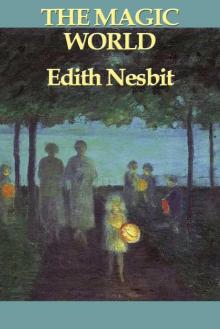 The Magic World
The Magic World In the Dark
In the Dark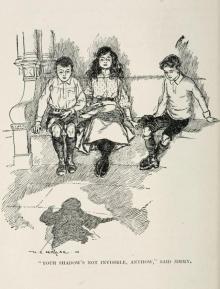 The Enchanted Castle
The Enchanted Castle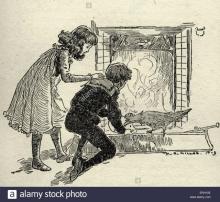 The Phoenix and the Carpet
The Phoenix and the Carpet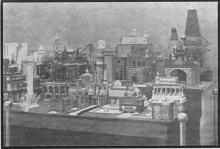 The Magic City
The Magic City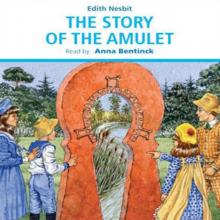 The Story of the Amulet
The Story of the Amulet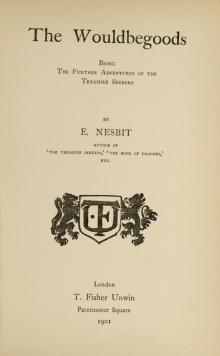 The Wouldbegoods: Being the Further Adventures of the Treasure Seekers
The Wouldbegoods: Being the Further Adventures of the Treasure Seekers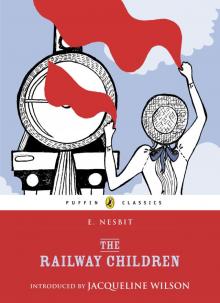 The Railway Children
The Railway Children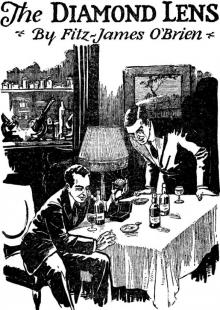 The Diamond Lens
The Diamond Lens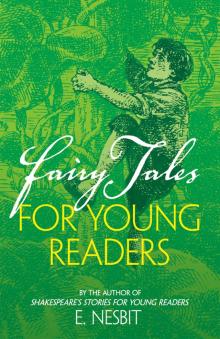 Fairy Tales for Young Readers
Fairy Tales for Young Readers Shakespeare's Stories for Young Readers (Dover Children's Classics)
Shakespeare's Stories for Young Readers (Dover Children's Classics) The Wouldbegoods
The Wouldbegoods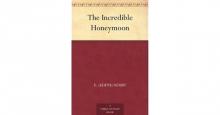 The Incredible Honeymoon
The Incredible Honeymoon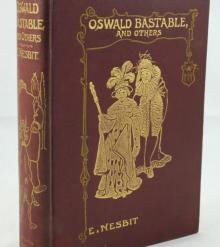 Oswald Bastable and Others
Oswald Bastable and Others Pussy and Doggy Tales
Pussy and Doggy Tales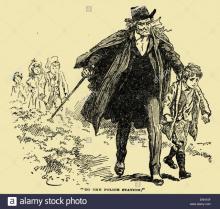 New Treasure Seekers; Or, The Bastable Children in Search of a Fortune
New Treasure Seekers; Or, The Bastable Children in Search of a Fortune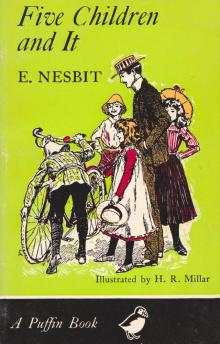 Five Children and It
Five Children and It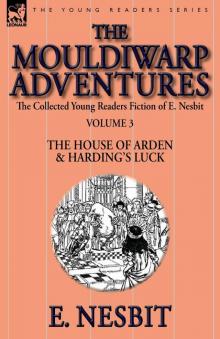 Harding's luck
Harding's luck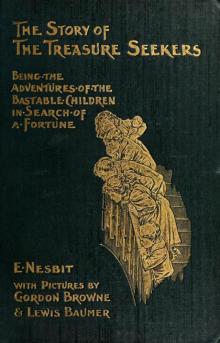 The Story of the Treasure Seekers
The Story of the Treasure Seekers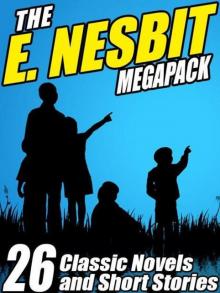 The E. Nesbit Megapack: 26 Classic Novels and Stories
The E. Nesbit Megapack: 26 Classic Novels and Stories Shakespeare's Stories for Young Readers
Shakespeare's Stories for Young Readers